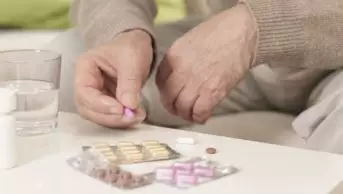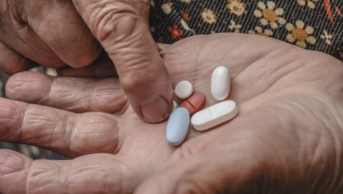In the absence of national guidance and advice on how to approach the issue of polypharmacy, NHS Highland has developed a guideline that details a systematic, evidence-based method for medication review in this patient group (see Briefing). GPs across NHS Highland have been carrying out such reviews since the guidance was issued in August 2010.
One GP surgery in Inverness involved me as the prescribing support pharmacist in the practical application of this guideline. Although the data from the area-wide reviews are still being analysed, this report aims to share some of the initial findings from the reviews in which I was involved.
Method
The surgery computer system was used to identify all patients resident in nursing homes. Patients in this group were collectively considered frail because they required help with daily activities, in addition to other patient-specific indicators of frailty. Each patient’s medical notes were reviewed with reference to the polypharmacy guidance and a polypharmacy review conducted. In addition to ensuring that each medicine had a valid and current indication, the review prompted consideration of whether each medicine was poorly tolerated in frail patients, whether it contributed to a high risk drug combination, or whether the desired clinical outcome from the medicine was unlikely to be achieved within a reasonable estimate of the patient’s expected life. The likely effectiveness of commonly used medicines is extrapolated from numbers needed to treat (NNT) from major studies, a summary list of which is included in the guidance. The completed review was then discussed with the doctor responsible for the nursing home and provisionally agreed. The author then discussed this information with the patient (where appropriate) and the patient’s carer or the nurse in charge. All agreed changes were documented in the patient’s notes and repeat prescription records amended.
Results
Sixty-five patients received a polypharmacy review. Of these, 37 (57 per cent) had their medicines stopped and 25 (38 per cent) had their medicines changed. A total of 80 medicines were stopped and 33 changed.
The number of changes that were made to patients’ repeat prescriptions ranged from zero (23 per cent of patients) to five (3 per cent of patients).
Cardiovascular drugs were most likely to be modified, followed by gastrointestinal drugs. This was mainly due to discontinuation of aspirin (eight patients) and simvastatin (eight patients). Other antihypertensives were also discontinued, including doxazosin (one patient), amlodipine (two patients) and losartan (one patient).
The nature of central nervous system medicines meant that modifications to therapy mainly involved dose reductions with the aim of withdrawing therapy over time, eg, sodium valproate for restlessness, amisulpride for agitation and gabapentin for postherpetic neuralgia.
Discussion
Polypharmacy medication reviews have proved thought-provoking. Unless contraindicated or the patient was exhibiting symptoms of, for example, hypotension it would be unusual to recommend discontinuation of cardiovascular or endocrine medicines. However, the systematic methodology outlined in the guidance made this a more comfortable process. It is easier to recommend discontinuing a prescription for a statin knowing that a reasonable estimate of the NNT to prevent a major coronary event in a patient with diabetes and no other cardiac history in the next year is greater than 200.
Angiotensin-converting enzyme inhibitors, primarily lisinopril, and other antihypertensives were discontinued in a number of patients, all of whom had blood pressure adequately controlled below recommended targets. Very tight control of blood pressure can be beneficial but large numbers of patients need to be treated for a long time to show an effect (New England Journal of Medicine 2010;362:1575–85). Sustaining such tight control in these patients was unlikely to provide a clinical benefit but did increase their risk of a fall in addition to increasing their daily tablet burden.
ACE inhibitors that had been prescribed for secondary prevention following a cardiovascular event with normal left ventricular function in two patients were discontinued. This is a high NNT strategy with around 280 patients per year requiring treatment to show benefit (New England Journal of Medicine 2000;342:145–53).
Diabetes medication was discontinued in two patients. In both cases HbA1c levels were sufficiently controlled to 6 and 6.4 per cent, figures below recommended national targets. The ACCORD study raised the possibility that tight HbA1c control could increase the patient’s risk of mortality (The Lancet 2010;375:481–9). One would envisage that the effect of hypoglycaemia and mortality may be more likely in the frailer patient group.
Although the reviews could have resulted in new medicines being initiated, these would have been for symptomatic relief and direct patient benefit. Discontinuing or reducing medicines that were unnecessary or unlikely to give a benefit within the reasonable expectation of that person’s lifespan was well-received by both patients and carers. All medicine changes were discussed with the patient or their carer, an approach that is in keeping with the process of concordance.
Referring to the polypharmacy guideline helped to facilitate a constructive medication review with frail patients and their carers, reducing the potential for adverse events and improving their well-being.
An ageing population suffering from multiple long-term conditions combined with the application of multiple clinical guidelines will inevitably increase the prevalence of polypharmacy.
The systematic approach and therapeutic principles that NHS Highland is pioneering should become embedded in practice. This will prompt healthcare professionals to consider the likely effectiveness of commonly prescribed secondary prevention strategies when reviewing the medicines of frail patients.
*‘Polypharmacy: guidance for prescribing in frail adults’ is available from the author
About the author
Alyson Warren is now a rotational clinical pharmacist at Raigmore Hospital, Inverness (email alyson.warren@nhs.net).


